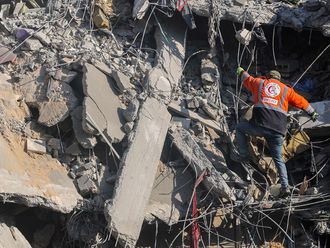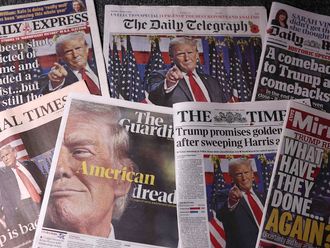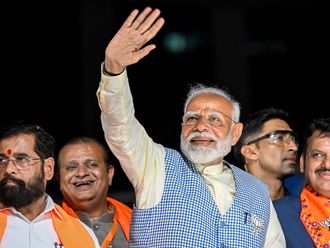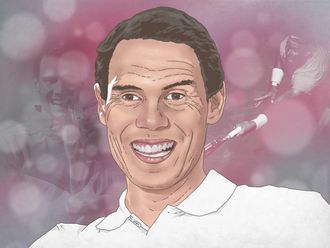The UAE has become synonymous with endless and unrivalled achievements at all levels, not only by Arab, Gulf or regional standards but also by global standards. It is almost impossible for one to keep pace with its achievements, where every global accomplishment that is attained is swiftly followed by another.
Just recently, the UAE passport ranked the most powerful globally in December 2018, according to the global Passport Index. In addition, the statutory increase in representation of Emirati women by 50 per cent in the Federal National Council that has been announced, which is due to take effect during the 2019 elections. I cannot say whether these signify the last of the UAE’s achievements in the race toward the highest global rankings, simply because another achievement may possibly emerge before this article is even published.
In this context, I will not dwell much on the details pertaining to the high regional and global rankings the UAE has attained, according to global competitiveness reports and their indexes issued by the relevant international institutions. The reader may visit the website of the Federal Competitiveness and Statistics Authority to view all information related to the UAE’s rankings in these reports and indexes.
The UAE’s insistence in occupying first place with regards to words and deeds continues to astonish the world, leaving it baffled as to how the UAE manages to achieve such monumental success despite its geographical location in a region plagued by underdevelopment, conflicts and instability. What are the reasons behind the “UAE’s Exceptionalism” within such a regional environment fraught with development problems and crises? Why does the UAE outpace and outperform major countries in the fields of development?
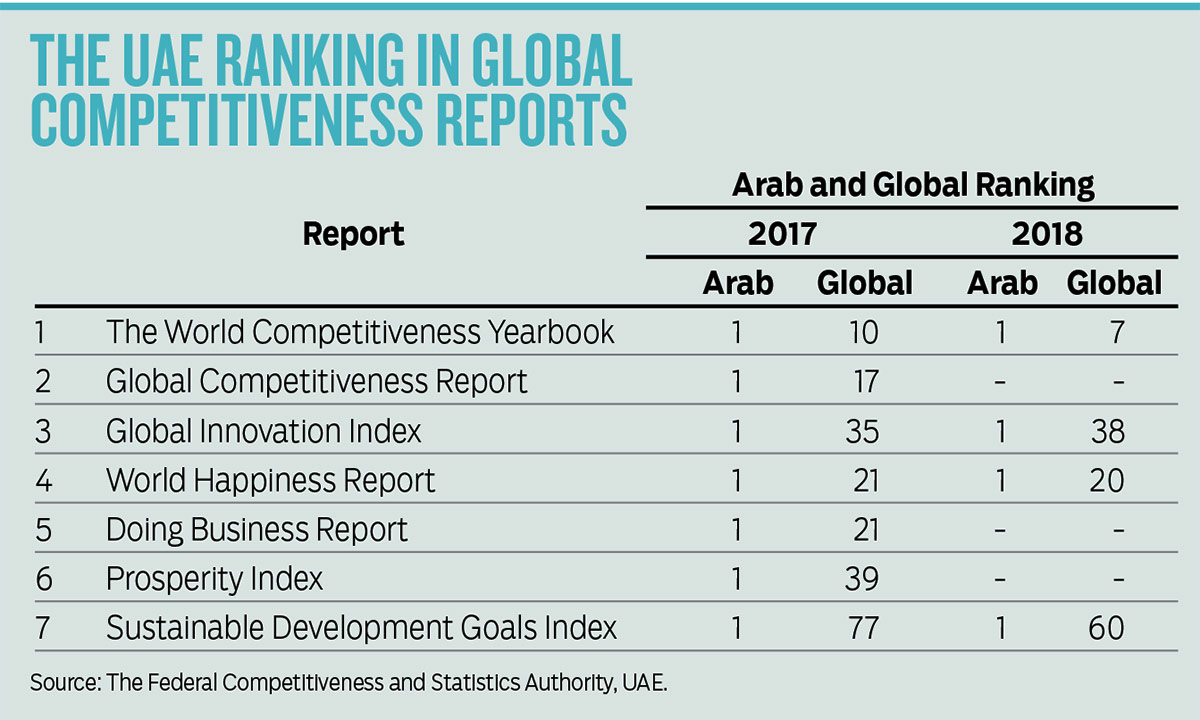
In my view, this UAE pre-eminence is a product of many factors, the most prominent of which are:
1) Visionary and strong-willed leadership: The stereotypical image that is usually attached to the Arab Gulf oil countries depicts them as countries with vast wealth, and that this is the reason behind the development they witness, especially with regards to infrastructure. However, the UAE experience clearly demonstrates that the issue is not merely about oil or wealth — despite the vital importance of oil in the development process of these countries. The real reasons behind these accomplishments relates to a leadership that possesses a present and future vision, ambition and strong will with the ability to transform ambition into reality; a leadership with a solid belief that citizens are the most precious wealth, and they are both the target and the means for development.
There are many countries in the region that have considerably more oil than the UAE, as well as other natural and human resources that are scarcely available in the UAE, compared to countries like Iraq, Libya and Iran, among others. Nonetheless, these countries have mismanaged their wealth and impoverished their people, and as a result have not achieved a tenth of what the UAE has been able to achieve. Why? In addition to other factors, these countries have not had the advantage of a robust leadership like the UAE’s nor a sound management of wealth for the purposes of building, development and progress.
Wealth is certainly important for making progress; but the critical factor is indeed the management of this wealth. According to management science, there is no such thing as a poor or rich country, rather there is poor or good management. Furthermore, wealth can become a burden if it is misdirected or misused.
2) Making pre-eminence an identity: The UAE has managed to make pre-eminence a part of its national identity. As a result, the Emirati citizen always aspires to be at the top of the ranks, regionally and globally. They do not perceive it as an extreme, distant or impossible target. This is a result of the continuous accumulation of achievements while transforming the impossible into tangible reality, because the UAE leadership refuses to recognise the word “impossible” as it believes this word “is the largest man-made prison, a word invented by people who do not want to work or do not want us to work, it is a word used by some people to put an end to their ambitions, dreams and aspirations,” which His Highness Shaikh Mohammad Bin Rashid Al Maktoum, Vice-President and Prime Minister of the UAE and Ruler of Dubai mentions in his book Flashes of Thought.
3) Self-confidence: Progress does not only depend on material components, but also on moral and psychological ones. A psychologically defeated people and those who have no confidence in themselves and their capabilities cannot excel, regardless of the resources they may have at their disposal. Anti-Arab forces have often exploited this phenomenon over the past decades for the purpose of weakening the Arab people’s self-confidence, resulting in their conviction as merely spectators or consumers of other nations’ civilisational accomplishments, and that the gap between themselves and the rest of the world was too wide to bridge. This has resulted in the spread of despair and frustration among them.
However, the UAE leadership, since the reign of Shaikh Zayed Bin Sultan Al Nahyan and his successor President His Highness Shaikh Khalifa Bin Zayed Al Nahyan, has managed to present a different image by enhancing people’s confidence in themselves and their potentials, and the belief that neither progress nor backwardness, regardless of time or place, arise arbitrarily. Neither can progress nor backwardness be considered unique to a certain country, people or society. Thus, the UAE has embarked on the path of progress, emulating the successful experiences of other nations that have managed to detach themselves from the darkness of poverty, ignorance and backwardness, in order to move forward along the path of renaissance, progress and modern civilisation. These nations have relied on knowledge, sound management and a clear future vision, that consider people as the source of real wealth and means of development and progress.
When the UAE launched its strategic plan “UAE Vision 2021” with the intention of placing the UAE among the best countries in the world during the Golden Jubilee of the Union, many in the region and the world viewed this goal as a difficult target to achieve. In fact, what has happened is that the UAE already reached this goal years ahead of schedule; indeed nobody can object or doubt the fact that the UAE has become one of the best countries in the world, not only by words, slogans and propaganda, but by evidence and facts, becoming a development phenomenon worthy of study and reflection. The same applies to the “UAE Centennial 2071”, which aims to catapult the UAE to the top of the list as the best country in the world in its centennial.
If common sense dictates that outputs are related to inputs, meaning that robust inputs lead to robust outputs, and vice versa, then the UAE is already capable of achieving its set goal in 2071, because the approach is robust. It is the same approach through which it has achieved all its global successes and achievements over the past years. The foundation of the UAE in 1971 was extraordinary despite all the signs to the contrary showing that unity was impossible, yet the founding fathers refused to accept this and proceeded with achieving their ambitions. They were self-confident and sure of what they did. This paved the way toward a strong will and determination to realise the goal, in turn creating an evident self-confidence in the minds and hearts of the Emirati people, positively reflected during the course of the past decades of the country.
4) Stability: Development and renaissance can only be realised in an environment with political stability, social stability and security. Since its inception in 1971, the UAE has existed in an exceptional state of stability at all levels. The country did not experience sectarian, ethnic and religious tensions, or social and factional conflicts or political tensions like the ones witnessed in the region; this is because it instilled citizenship, the rule of law, justice and balanced development serving the people throughout the country. Although a parliament (the Federal National Council) has existed in the UAE since 1972, a year after its foundation, it has never experienced a single clash with the government. The relationship between the two authorities was based on cooperation, coordination and joint work for the interest of the nation and the people. This has allowed the UAE to focus its efforts on development and direct its resources to serve the right purposes; however, some countries in the region have had religious, sectarian, ethnic and political conflicts that diminished their efforts as well as resources, allowing them to fall behind in the regional and global development races.
5) Value system: Real development cannot be realised in closed societies, where fanaticism, extremism, exclusion and hostility prevail. This has been the UAE’s belief since its inception. Thus, this has deepened the values of tolerance, openness, acceptance, moderation and balance. It has become a model not only regionally but also globally, becoming a source of inspiration for all those who seek ways in which to confront religious, sectarian, ethnic and cultural conflicts that threaten world peace and security. The directives of Shaikh Khalifa that the year 2019 will be called the Year of Tolerance, is considered an affirmation of the global role that the UAE has played in advocating tolerance and renouncing fanaticism and conflict.
After pointing out the most important factors that I believe represent the pillars of UAE pre-eminence at the regional and global levels, I would like to refer to three final points: the first relates to the overall power perspective of the UAE, which involves the UAE’s great achievements adding more to the positive image of the UAE on the global stage, strengthening its soft power which itself is an essential aspect within the overall power apparatus of any nation in the age of globalisation and the communications revolution. The second relates to the important role played by the UAE as a source of inspiration for the Arab people in their quest for progress and development under the circumstances of tension, despair and uncertainty of the future, which are prevailing sentiments in many parts of the Arab world. This is precisely what His Highness Shaikh Mohammad Bin Zayed Al Nahyan, Crown Prince of Abu Dhabi and Deputy Supreme Commander of the UAE Armed Forces, stated in his speech on the occasion of the 47th National Day in December 2018, when he said: “The United Arab Emirates, with its massive modern achievements brings hope to the hearts and minds of each Arab citizen, especially the youth, while highlighting an important message that Arabs are capable of success, excellence and real competition in the field of global advancement due to the strength of will, ambition, self-confidence, and serious planning of the present and the future. Therefore, what is being accomplished in the UAE can be viewed as a source of inspiration for the entire region, and a source of pride and joy for every Arab. The achievements of the United Arab Emirates supplement the accomplishments of the Arab civilisation in the face of attempts to distort the Arabs’ image, undermine them and spread despair and frustration among them.”
The third point has also been referred to by Shaikh Mohammad Bin Zayed on the occasion of the 47th National Day when he said: “The successes that the United Arab Emirates has achieved and will continue to achieve, God willing, at all levels confirms to the world that the Arab world is not the distorted image that extremists and terrorists attempt to portray abroad, and which the enemies try to manipulate for mischievous purposes; nevertheless, Arabs are indeed the face of hope, achievement, openness and tolerance. They work vigorously for real participation in the march toward human civilisation.” Thus, the impact of the UAE’s experience in its continued efforts to reach the highest rank expands toward a broader Arab context. It is the source of hope to the Arab people and represents a diverse and positive image in the international arena.
Dr Jamal Sanad Al Suwaidi is a UAE Author and Director-General of the Emirates Centre for Strategic Studies and Research.


